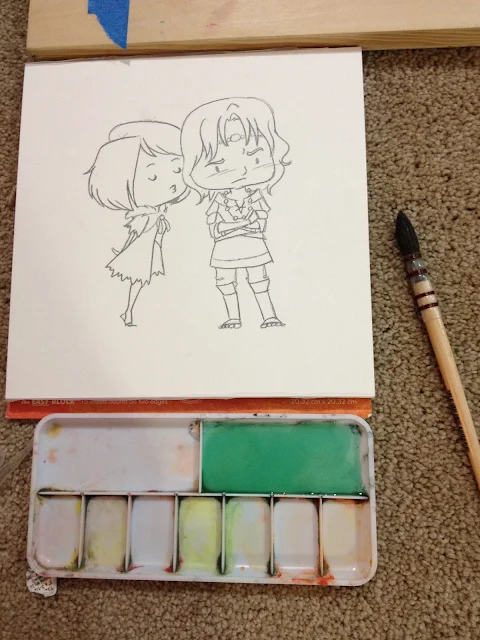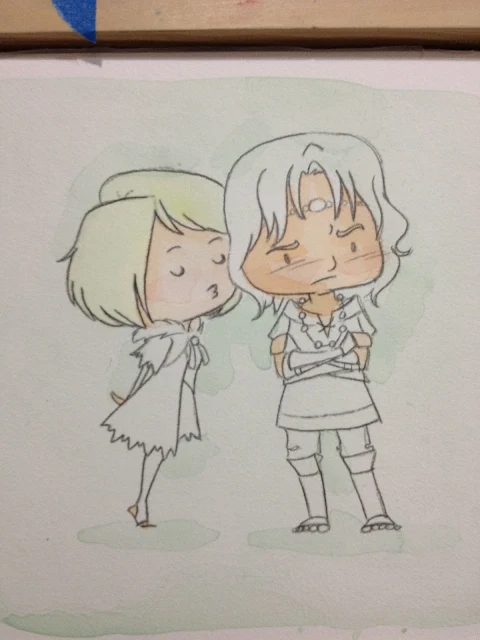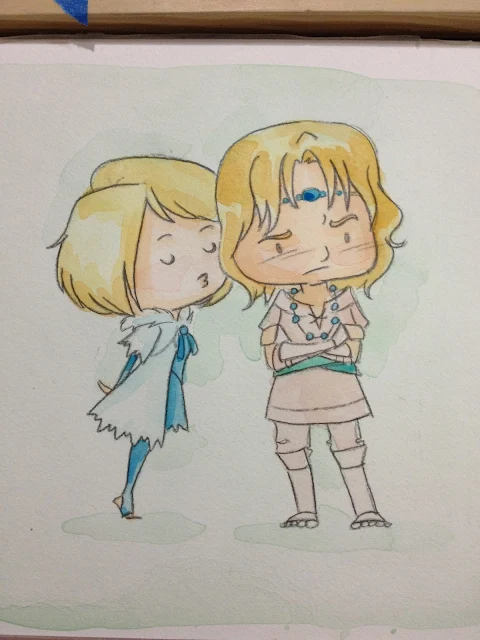Simple Vs. Original Watercolor Commissions
Currently I offer two types of watercolor commissions. The simple type, running from $10-$20, quickly proved itself to be a popular option at this year's Mechacon. Designed to be painted quickly and with a limited color palette, the Simple Watercolor commission is available in a smaller size and utilizes simplified forms to help speed up the time it takes to finish. While some may disparage this cheaper option, it's a great solution that's flexible enough to be done behind the Artist Alley table, an impressive feat in and of itself. The Original Watercolor commission option must be done at home, as it utilizes computer, scanner, larger watercolor paper, which requires stretching and longer drying times. The Original Watercolor commission is much more detailed both in drawing and coloring style than the Simple watercolor option, but both have their selling points. In this post, I'm going to go through the process and materials for both types of commissions, starting with a pencilled and stretched Original Watercolor commission, and a pencilled Simple Watercolor commission. Since watercolor is a medium that requires time for drying, I was able to work on both commissions simultaneously, and photographed them together.
As always, I apologize for upside down photos.
Stretched 10X15 cold press watercolor paper. Original sketch was printed in blue ink, outlined in pencil. Blue printer ink washes away with initial stretching of paper.
Materials used with Simple watercolor commission. Small plastic palette, Sakura Koi field set with 12 pans. Limited selection of brushes selected for durability (usually a synthetic/natural mix, a lot of Neptunes in there) and resiliency. Miniature water wells. White gouache. Color reference.
Materials used for original watercolor commission. Large watercolor palette (I usually use more than just one). Large watercolor box with carefully selected watercolor pans and color reference sheet. Large selection of brushes.
Comparison of sets (I keep them separate)
Comparison of palettes.
Initial Color Wash: Original watercolor commission.
Brush used: Synthetic Cotman mop
Adding background shadows to help push illusion of light
Adding color: Simple watercolor commission
Depth of color is achieved utilizing layers of same color, or slightly more saturated color
Adding color: Original watercolor commission
Shading is achieved by subtle layers of same color. Additional shading is added using contrasting colors, shadows applied with a mix of Payne's grey and indigo when necessary.
Original Watercolor Commission
Details were added with gouache and color pencil.
As always, I apologize for upside down photos.
Comparison of Set Up and Materials
Stretched 10X15 cold press watercolor paper. Original sketch was printed in blue ink, outlined in pencil. Blue printer ink washes away with initial stretching of paper.
Simple watercolor commission on 8"x8" cold pressed watercolor pad (fluid), taped at two ends. Graphite transfer of original sketch, tightened in pencil. No need for stretching.
Materials used with Simple watercolor commission. Small plastic palette, Sakura Koi field set with 12 pans. Limited selection of brushes selected for durability (usually a synthetic/natural mix, a lot of Neptunes in there) and resiliency. Miniature water wells. White gouache. Color reference.
Materials used for original watercolor commission. Large watercolor palette (I usually use more than just one). Large watercolor box with carefully selected watercolor pans and color reference sheet. Large selection of brushes.
Comparison of sets (I keep them separate)
Comparison of palettes.
Comparison of Process
Applying initial color wash: Simple watercolor commission
Brush used: Synthetic squirrel mop (Creative Mark)
Initial Color Wash: Original watercolor commission.
Brush used: Synthetic Cotman mop
Adding background shadows to help push illusion of light
Adding color: Simple watercolor commission
Depth of color is achieved utilizing layers of same color, or slightly more saturated color
Adding color: Original watercolor commission
Shading is achieved by subtle layers of same color. Additional shading is added using contrasting colors, shadows applied with a mix of Payne's grey and indigo when necessary.
Finished Products:
Simplified Watercolor Commission
Details were added with gouache and color pencil.













































Comments
Post a Comment